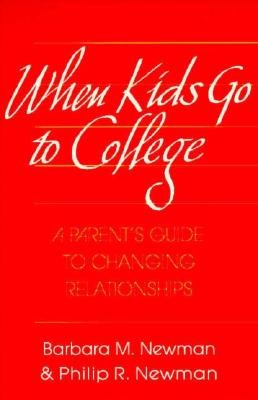
- We will send in 10–14 business days.
- Author: Newman & Newman
- Publisher: Ohio State University Press
- ISBN-10: 0814205623
- ISBN-13: 9780814205624
- Format: 15.2 x 23 x 1.6 cm, minkšti viršeliai
- Language: English
- SAVE -10% with code: EXTRA
Reviews
Description
"The Newmans speak with the expertise of parents, psychologists, and professors as they describe the developmental changes that occur in college kids as they undergo a 'personal synthesis.' . . . With the insight available here, a parent can feel reassured and better able to assist when called upon." -Booklist What happens at college? This practical guide will answer that important question and tell you how to make the most of these exciting years. identity formation - values development - career exploration - social relationships - sexuality - alcohol and drug abuse - romantic relationships - dorm life - personal freedom - depression - discrimination - college bureaucracy Barbara and Philip Newman are the authors of many books on human development, including Development through Life: A Psychosocial Approach, now in its fifth edition; An Introduction to the Psychology of Adolescence; Adolescent Development; Understanding Adulthood; and Personality Development through the Life Span, as well as numerous articles. Barbara Newman is Associate Provost for Faculty Recruitment and Development at The Ohio State University and formerly was chairperson of the Department of Family Relations and Human Development at Ohio State. Philip Newman is Senior Researcher in the Office of Academic Affairs, Adjunct Professor in the Department of Human Ecology, and Lecturer in Educational Services and Research at The Ohio State University. He formerly was director of the Human Behavior Curriculum Project of the American Psychological Association.
EXTRA 10 % discount with code: EXTRA
The promotion ends in 22d.07:16:40
The discount code is valid when purchasing from 10 €. Discounts do not stack.
- Author: Newman & Newman
- Publisher: Ohio State University Press
- ISBN-10: 0814205623
- ISBN-13: 9780814205624
- Format: 15.2 x 23 x 1.6 cm, minkšti viršeliai
- Language: English English
"The Newmans speak with the expertise of parents, psychologists, and professors as they describe the developmental changes that occur in college kids as they undergo a 'personal synthesis.' . . . With the insight available here, a parent can feel reassured and better able to assist when called upon." -Booklist What happens at college? This practical guide will answer that important question and tell you how to make the most of these exciting years. identity formation - values development - career exploration - social relationships - sexuality - alcohol and drug abuse - romantic relationships - dorm life - personal freedom - depression - discrimination - college bureaucracy Barbara and Philip Newman are the authors of many books on human development, including Development through Life: A Psychosocial Approach, now in its fifth edition; An Introduction to the Psychology of Adolescence; Adolescent Development; Understanding Adulthood; and Personality Development through the Life Span, as well as numerous articles. Barbara Newman is Associate Provost for Faculty Recruitment and Development at The Ohio State University and formerly was chairperson of the Department of Family Relations and Human Development at Ohio State. Philip Newman is Senior Researcher in the Office of Academic Affairs, Adjunct Professor in the Department of Human Ecology, and Lecturer in Educational Services and Research at The Ohio State University. He formerly was director of the Human Behavior Curriculum Project of the American Psychological Association.


Reviews